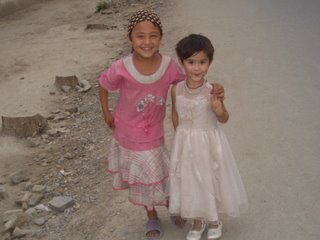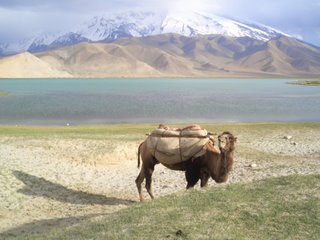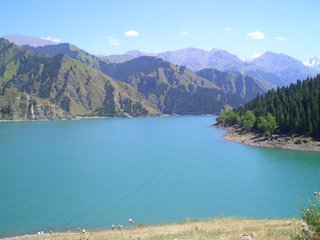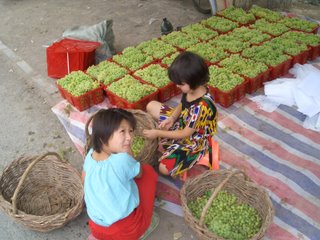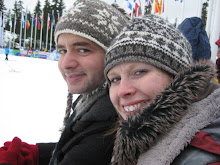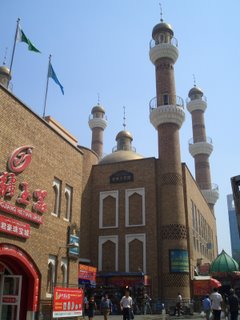 Day 30 (8/18) - Urumqi
Day 30 (8/18) - UrumqiThe sleeper bus arrived in Urumqi in the afternoon , and to my astonishment we were only one hour late. Urumqi is Xinjiang's black hole which I was now passing through for the fourth and last time, in order to get a train back to Zhangye. So I checked into the same hotel and set about killing another evening.
With hopes high, I decided to give Hu Yan a call, the girl who gave me her phone number last time I was in town. She sounded genuinely delighted to hear from me - and was also in the city of Hami for the weekend. I lead the romantic life of a poorly written sitcom character. This was especially appropriate because I had considered going straight to Hami, since it's about halfway to Zhangye and I could visit the British teacher Tracy who just left Zhangye for Hami.
As I paid for the phone call the shop owner, who undoubtedly would have been listening in on my struggling Chinese conversation, wanted to show off her "English-speaking" daughter. To my totaly surprise she did speak extremely quiet and nearly-fluent English, and I didn't know to make of her. Some Uyghurs could pass as Westerners, and she looked like a British imposter working undercover in a Uyghur convenience store. I guess she actually was Uyghur, but has been living in Australia.
With nothing to do I once again headed to Fubar, the Western bar. There is a middle-aged man I have seen there every time who depresses me because he looks like a lonely, balding version of me. He probably teaches English. A small group of regulars and an owner were pre-occupied at the other end of the bar with a new toy - a large hour-glass monstrosity with multiple taps for dispensing absinthe, which was taken down from the shelf. One of them was telling an absinthe story from Norway that ended with him not remembering a full day in which he took a plane to Beijing, without any of his luggage.
After a while, an older Chinese man struck up a conversation with me in English. He introduced Tian Tian ("Heaven"), the pretty and much younger girl sitting between us, as "my girlfriend... but only for tonight." Sympathizing with my traveling alone, he related his visit to Australia - "I sat alone in the pool. I had no lover. Not interesting." Tian Tian involved herself in the conversation by toasting my glass every two minutes. Even among a group of people, drinking from your glass alone is considered rude or at least odd in China.
Back in my hotel room, I had to ignore several calls from the local brothel, who I could hear making the rounds of all the rooms. When they called earlier they sounded so bored and listless I thought it must actually be the front desk, until they managed in terrible English "do you want a massage?". Mostly I was just bothered by them calling each night when I was trying to sleep; I need to learn how to tell people off in Chinese.
Day 31
For about the twentieth time in Xinjiang I ordered zhua fan, a good lamb and rice dish. That morning, however, I got a special bonus - a front-row view of the skinless and headless animal gracing another table, which the cook soon set about sawing in half. Call me old-fashioned, but I tend to like kitchens with walls.
Allow me to once more vent my frustrations on buying train tickets. I would best compare it to getting tickets for the most popular rock tour in America, except they can only be bought in person with cash in the city of the show, and go on sale about 5 days beforehand. Even the travel agencies (the "ticket scalpers" you might say) had no tickets, so I went to the station to see what I could turn up. Chinese people have only the barest concept of the line, and the closer you get to the front, the more prison rules set in. Someone just behind me elbowed me out of the way and quickly ordered, but when another person behind me actually reached their arm over me with money in their hand and shouted what they wanted, the counter woman angrily told him to wait his turn. There were no sleeper tickets to Zhangye (or anywhere I expect), just hard seat tickets, so I got one that left in two days and hoped I could upgrade on the train, which I've been told is easy to do. This was a huge mistake, but more on that later.
I spent the rest of the afternoon using the internet in one of the numerous internet cafes in Urumqi. For some reason internet cafes ("net bars") in China are always in ill-lit, smoke-filled and seedy basements, like modern opium dens. And for some they seem almost as addicting - the only student I failed last term was apparently a net bar addict, who never attended any of his classes or even his final exams. For dinner I decided to treat myself to a Brazilian barbecue restaurant called Sabbath I had heard about, which had live music. When I told the waitress I was alone she laughed and said "only one?", which of course didn't make me at all self-conscious. The band was terrible, though they seemed to be actually Brazilian. Maybe classy Asian bars and restaurants act as a dumping ground for mediocre Western musicians, like in Lost in Translation. I should move to Shanghai, brush up on "Hotel California" and "Scarborough Fair" , and start a jazz band. The food was good, but shockingly expensive - about 12 times what I normally pay for dinner.
With nothing to do but go to a bar again, I figured I could at least try a new place. I don't know what the bar I went to was called, but it was aggressively promoting Carlsberg "Chill" beer and I couldn't think of a more appropriate name for the place. It was trying very hard to be cool, with Western movie posters and a tiny see-through dance floor equipped with a dozen lights and even a smoke machine. However, it was definitely cheesy and definitely lacking in customers for a Saturday night. I sat in one of the booths, but was soon told to sit at one of the plain tables in the middle because the booths for reserved for certain people. I then noticed the tables were labeled "B" and the booths were "A", and actually at a higher elevation. I didn't understand, or really care, what you needed to do to get into an "A" booth (Party official?). The server wanted to know what the word for "bar" was in English, which I supposed might be the height of my conversation success there.
I was quickly bored and a little self-conscious about being alone in such a big, empty place. However, there was an attractive and bored-looking Chinese girl sitting alone in a booth who seemed to be casting glances in my direction, so I figured it couldn't hurt to try invading "A" territory one more time. She made no objections to my sitting there, and we proceeded to have two different conversations. She would repeat what I said to herself, making it obvious she heard something else each time, so I imagine it went something along the lines of "I work as an English teacher" "Oh, so you just got out of prison, interesting." Then she would say something to me I didn't understand at all, and I would smile and nod in agreement. Alas, the scintillating conversation was interrupted by the server, who in nervous English said:
"If you want to talk to her, you must pay, 20 yuan per hour"
"Huh? You mean to sit here?"
"To talk to her"
Then she said something about how she was working, and the wheels slowly clicked into place.
"Ohhh.... I didn't know. No thank you" I said, making my exit. I suppose that was less awkward than it might've been if he hadn't said anything.
On the street I heard what sounded suspiciously like a live band, and to my surprise there actually was a band in another bar. I'm not sure I'll ever be impressed with Chinese rock music, but they really had some life to them and were fun to watch. For a couple of songs there was a talented female singer, including one which seemed to be in English, although the only word I could make out was "Jesus." I would love to see more live music in Zhangye, but I won't be making any plans to move to Urumqi anytime soon.
Day 32
I had yet to see the market and Muslim quarter of Urumqi, which turned out to be the most interesting part of the city I know of. There happened to be another backpacking Westerner at the restaurant I ate lunch at named Derek, and when we struck up conversation he turned out to be a Peace Corp volunteer who also knew Julian and Cynthia, the PC teachers who had just left Zhangye. Small, strange world when you travel. As he taught at a medical college he had done a unit on sex ed, which he was sure was going to get him fired when the students started bringing things to their presentations like condoms on cucumbers and a videotape of a cat, well, pleasing himself. I always wonder what's really going on behind the innocent faces I teach. I thought my being in Urumqi a day longer than expected might at least allow me to meet up with that girl Hu Yan, but as I should have surely known before calling, the cruel masters of fate responded by delaying her weekend trip another day.
Day 33
My last day in Xinjiang. My train left around 7pm, so I had time to finally see the museum in Urumqi. I was pleased to see a proper museum, with air-conditioning and more than one room, more than one floor even. There were good displays about the numerous ethnic minorities Xinjiang and the region's history (which, as told by the plaques, is nothing but an inspiring account of varied ethnic "brothers" working joyously towards the common goal of development and securing the borderland). I enjoyed the miniature models of places I had actually been to throughout Xinjiang. As in the Hotan museum the highlight was the mummies, with a whole room dedicated to them, including a bizarre fixation on the "Loulan Beauty" with both a painting and a full-size clay model guessing what she looked like before she was a shriveled, decrepit mummy.
And then it was time to board the last train. I tried to head directly for the desk that upgraded tickets, but was waiting in the wrong spot and ended up as a late arrival in the small, aggressive crowd. I was told there were no sleeper tickets when I did get through to the ticket woman, and got the same news when I checked back later as some were told to do. I'm not sure what quirk it is in the ticket system that allows there to be sleeper tickets available to be purchased on the train when they are impossible to get beforehand, but it turned out to be a false hope. As I thought might likely happen, I prepared myself to sit in "hard seat" class for the 15 1/2 hour overnight journey to Zhangye, wishing again I had broken up the trip by stopping in Hami. The guide books generally recommend not getting a hard seat ticket for a trip of more than 4 hours. It was fine for the first six hours or so, but as about 8 hours passed and it got towards the time I ought to be sleeping, my tolerance started to wear very thin.
Day 34 - return to Zhangye
The last 7 or 8 hours truly sucked - the bright lights worked against the tiny shred of hope for sleeping I had, and the crowded aisles weren't really a break from the cramped seat. I had to remind myself that I was only of hundreds of people doing this (no empty seats, most continuing further to Lanzhou) and they mostly seemed to take it in stride, playing cards and joking around and, somehow, sleeping. The Chinese have developed an amazing talent for not being bothered about things. Nonetheless, the last hours passed painfully slowly, especially when the train was delayed by one and a half hours, and after 17 hours overnight in a seat I was less thrilled during my return to Zhangye in the morning than I expected. I also managed to get some kind of illness in that time, so my first 48 hours back in Zhangye have mostly been spent sleeping and feeling like I got in a fight, and lost.
However, two days later I'm returning to normal, and enjoying the normalcy of being in my apartment and a city I'm on good terms with. Even if I pulled together the funds, I'm not sure I would fully enjoy one of those one-year round-the-world backpacking epics some people do, at least not on my own. I've been fortunate enough in life that I have difficulty saying which trip was the best, but Xinjiang definitely lived up to expectations. Along with the longest time I've spent traveling, the trip could be described in numerous dramatic exclamations - the farthest city west in China ! the hottest spot in China! the second-lowest place in the world! the largest province in China - 1/6th of the country, and four times the size of California! the farthest city from the ocean in the world! mountains! deserts! colorful minorities! camels! Actually, after a full year I'll have seen little of the most typically "Chinese" parts of China, though there's always time for that later. Out of curiosity I've made an estimate of the number of hours I spent on buses and trains between cities on the trip, and came up with 192, or about 8 full days. It's surprising that "Xinjiang" is a name pretty much unheard of in the West, but like most I couldn't name more than about three cities or any of the provinces in China before coming. Nows it's back to the life that I've come to know here - running into students on the streets (and forgetting their names), walking beneath the bright lights of Zhangye at night, and forgetting what it was to be anonymous. It's good to be back.
